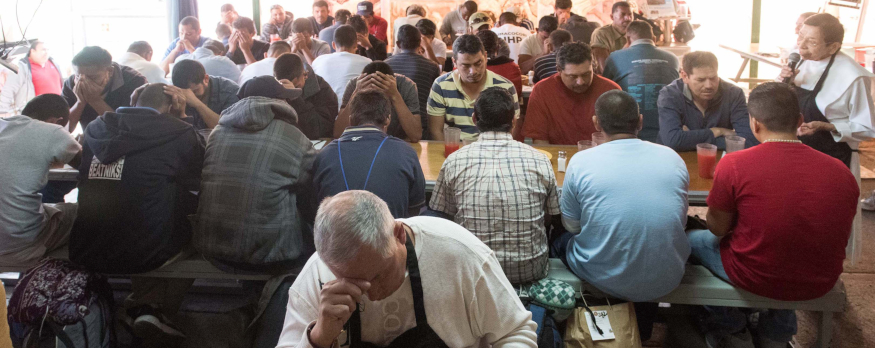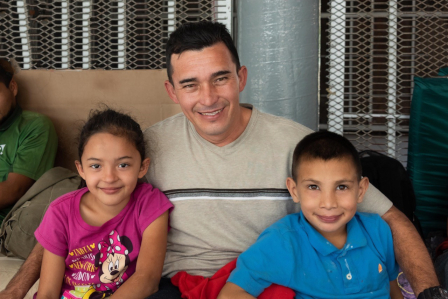
Lunch at Kino Border Initiative
EDITOR´S NOTE: We interviewed Joanna Williams, Director of Education and Advocacy, at Kino Border Initiative (KBI) who shared her knowledge of KBI and her thoughts on ways in which Jesuit Universities can support their mission.
Look at any map and you will find borders. Some are formed by topography, but most are largely theoretical and political, drawn by human hand as a result of war, negotiation or expediency. Borders ask us the question of whether they exist to keep something in or keep something out.[1](Donahoe, Piccin; 2015)
The U.S.–Mexico border runs almost 2,000 miles from the Gulf of Mexico to the Pacific Ocean. American officials estimate 500,000 people cross the border each year without authorization. These individuals are men, women and children that are forced to leave their homes because of violence in their communities and lack of economic opportunity to provide a dignified life for their family.
Those who arrive at the border encounter significant violations of their rights to safety, asylum, just treatment, property, and health by Mexican officials and U.S. officials alike. Others who have been living in the United States for decades are separated from their families through deportation and have to face difficult decisions about whether to remain in Mexico or attempt to reunite with their children.
In January of 2009, a group of church organizations (The California Province of the Society of Jesus, Jesuit Refugee Service/USA, the Missionary Sisters of the Eucharist, the Mexican Province of the Society of Jesus, the Diocese of Tucson and the Diocese of Nogales) got together to start the Kino Border Initiative (KBI).
Rooted in the Jesuit tradition and named for Fr. Eusebio Francisco Kino, a 17th-century Jesuit missionary who ministered in the Arizona border region, KBI seeks to humanize the process of migration within the U.S.-Mexico border through:
- Direct humanitarian assistance and accompaniment for migrants,
- Social and pastoral education for communities on both sides of the border, and
- Participation in collaborative networks that engage in research and
advocacy to transform local, regional, and national immigration
policies.

Family at Kino Border Initiative
The GC36 and Fr. General constantly remind us to be colleagues in our mission of faith, justice and reconciliation. Kino Border Initiative collaborates with different Jesuit structures, institutions and projects that serve as companions in deepening their mission and extending their ministry.
Kino Border Initiative was founded as a fully binational organization, which means that it is a bi-provincial project within the Society of Jesus. That bi-nationality is key to the richness of KBI’s mission and permeates every aspect of its work. Today, KBI is actively involved in the Jesuit Migration Network of Central America and North America in both advocacy and case referral work. KBI also collaborates with the Ignatian Solidarity Network in the United States in developing strategy, providing resources, and planning events that engage Jesuit institutions in education and advocacy.
In its educational and advocacy mission Kino Border Initiative works closely with Jesuit universities, with an understanding of the need for consciousness efforts on both personal and structural levels. For example, it welcomes weeklong immersion trips which brings students, faculty and staff close to the margins and help them understand at a deep level the challenges facing migrants and all those who live at the border. They meet with a spectrum of people that are involved in immigration, including police, refugees, immigrants, and people who are involved in the caring of the migrant population. The immersion provided by KBI gives these individuals a very holistic perspective of the social justice issues surrounding the border.
Support is also given to on campus student initiatives through “border initiative” student clubs and advocacy video series that advocate for border and migration humanization and rights.
During the year, KBI advocates about the situation at the border and their work at Jesuit Universities all over the world, such as: Fordham University, Universidad Iberoamericana Ciudad de México, Creighton University, University of Scranton, Georgetown University, University of San Francisco, Santa Clara University and more.
As we move forward, Kino Border Initiative will continue to serve at the borders, “walking with the poor, the outcasts of the world, those whose dignity has been violated, in a mission of reconciliation and justice.” The question is: what are Jesuit Higher Education institutions called to do to further KBI’s mission?
Joanna suggest that maybe we can start by engaging in research regarding topics relevant to KBI, especially those that allow a deeper reflection on issues about which KBI seeks to advocate. Additional support through student internships, especially from law students and students with video or media experience, will also help further KBI’s mission. Together through working with KBI we can unite our journey to foster a more humane, just and workable migration between the U.S. and México.
Links of interest:
Donate to Kino Border Initiative: https://www.kinoborderinitiative.org/give/
Kino Border Initiative: https://www.kinoborderinitiative.org/
Story of migrant (Fredy): https://www.kinoborderinitiative.org/fredys-story/
Story of migrant (Cinthyas): https://www.kinoborderinitiative.org/cinthyas-story/
Bellarmine Chapel welcomes a Salvaran Family: https://ignatiansolidarity.net/campaignforhospitality/2018/05/17/encounter-hospitality-bellarmine-chapel/
* Thank you note: We want to thank, Brittany Fried, graduate from Georgetown University for her collaboration in this article.
[1] Donahoe, Jeffrey; Piccin, Sara; (2015) Crossing the Border, Georgetown Magazine.
